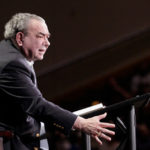 Article: Dr. Sam Storms – 10 Things You should Know About the Church (original source here).
Article: Dr. Sam Storms – 10 Things You should Know About the Church (original source here).
It’s both amazing and deeply distressing that I continue to hear of people who are supposedly “in love with Jesus” but not with the church. “We like you, Jesus, but we don’t care for your wife!” Really? The so-called “organized” church is for some reason offensive to them. Does the NT support such a notion? Is it possible for someone to be a Christian and remain opposed to his Bride, the church? I hope these ten truths about the church will forever put that misguided idea to rest.
(1) The church is the primary means by which or through which God makes known the glory of his saving wisdom. We read this in Ephesians 3:10 – “so that through the church the manifold wisdom of God might now be made known to the rulers and authorities in heavenly places” (Eph. 3:10).
God’s ultimate aim is that his own “manifold wisdom” might be made known “through the church”. The word translated “manifold” could be rendered “richly diversified,” “multifaceted,” “highly variegated,” or “infinite diversity.” God’s saving wisdom is gloriously intricate in its design and its effect. It is the very antithesis of boredom and routine.
The “rulers and authorities in heavenly places” are angelic beings, primarily demonic spirits (see Eph. 1:21; 6:12; Col. 1:16; 2:10). In this way these fallen spirits are provided with a tangible reminder that their authority has been decisively broken and that they, indeed all things, have been made subject to Christ. Note: the purpose for the church extends far beyond its internal ministries. God intends for the church to serve a larger, indeed cosmic, purpose in spreading his glory.
God intends to accomplish “through the church,” not nature, nor other angels, not the animal kingdom, but through the church! It is through the very existence of this new multi-racial, trans-cultural community of believers in which Jew and Gentile are co-heirs of the promises that God makes known his wisdom. No other organization on earth, neither government nor educational institutions nor civic clubs can accomplish this purpose. What, then, becomes of the display of God’s wisdom when the church remains internally divided and externally segregated?
(2) The Greek word ekklesia, translated “church,” is occasionally used in a non-technical sense to refer to an assembly or congregation of people (see Acts 7:38; 19:32, 39, 41; also Hebrews 2:12 which is a citation from Psalm 22:22).
Some have tried to argue that since ekklesia is built on two words that mean “out of” and “to call” that the church should be defined as those who are “called out of” the world to be God’s people. But it is a mistake to build a definition of a word based on its component root parts. Meaning is based on usage, and the predominant usage of ekklesia is assembly, gathered ones, congregation.
A close study of the word in the NT reveals that there are two fundamental senses in which we may speak of the “church”: the universal or invisible “church” and the local or visible “church”. Most often in Paul’s writings the word ekklesia refers to actual concrete gatherings of Christians in a local setting (1 Cor. 4:17; Rom. 16:5; Philemon 2; Gal. 1:2).
We refer to this as the “visible” church because it is comprised of actual people who can be seen, known, and counted. The “local” or “visible” church may also be designated in two ways, either as a group of local churches in a particular geographical region (Gal. 1:22 [“the churches of Judea”]; possibly also Acts 8:3 and 1 Timothy 3:15) or as individual churches in a particular city (see above).
(3) But on occasion, ekklesia appears to refer to an entity that is much broader than any one local congregation (Gal. 1:13; 1 Cor. 10:32; 15:9; Phil. 3:6; Col. 1:18, 24).
Other similar uses of ekklesia, in which the word appears to have in view the universal Church, the “body” of all believers, indeed all Christians collectively in every geographical location together with those who have died and are now present with Christ in heaven, can be found in Ephesians 1:22; 3:10, 21; 5:23, 24, 25, 27, 29, 32. We read this in Hebrews 12:22-23, a description of those now in heaven:
“But you have come to Mount Zion and to the city of the living God, the heavenly Jerusalem, and to innumerable angels in festal gathering, and to the assembly [lit., ekklesia, church] of the firstborn who are enrolled in heaven, and to God, the judge of all, and to the spirits of the righteous made perfect . . .” (Heb. 12:22-23).
(4) There are several ways in which the word “church” is never found in the NT. (a) You never find in the NT the word “church” used to refer to a building or physical structure. Whereas a particular local “church” may meet in someone’s house (e.g., Rom. 16:5), or today in a building, the structure itself is never called a church. (b) You never find in the NT the word “church” used to refer to a denomination. (c) You never find in the NT the word “church” used to refer to an organization of believers related to a specific country or nation, such as the Church of England (Anglican) or the Church of Scotland.
(5) We must remember that the NT never entertains the idea of someone being a member of the universal or invisible Church who is not also an active member and participant in a local church. Ideally, the two should be co-extensive, but reality is such that there are many who are “members” or who are present within a local church who are not “members” of the universal body of Christ (see 1 John 2:19).
(6) Some say the “church” or the “assembly/congregation” of God’s people began with Adam, while others say it began with Abraham. But I have in mind what we know to be the “body of Christ” (see 1 Cor. 12:12-13), that spiritual organism that is comprised of both believing Jews and believing Gentiles who share equally in the promises of God and have all been baptized by Jesus in the Holy Spirit. Several texts suggest that this “church” began or was birthed at Pentecost when the Holy Spirit was poured out permanently on all believers. See Matthew 16:18 (the “church” that Jesus would build is yet future); 18:15-20; Ephesians 2:11-22; 3:4-6. The “church” thus began with the experience we know as Spirit baptism (inaugurated at Pentecost), a work of Jesus Christ that incorporates believers into his spiritual body (1 Cor. 12:12-13; 12:27).
(7) Here is a good working definition of the church. A local church is a group of baptized believers in Jesus Christ who meet regularly in corporate assembly to worship God, through Jesus Christ, in the power of the Holy Spirit. Certain practices are essential to this gathered body: they are under the authority and guidance of duly appointed Leaders; they are regularly taught the Word of God; they celebrate the ordinances of Baptism and the Lord’s Supper; and they consistently practice Church Discipline.
There are certainly other features and ministries that ought to characterize every local church, such as evangelism, mutual accountability and encouragement, missional outreach, the exercise of spiritual gifts, etc. But the absence of these latter factors only means that a local church is weak or is falling short of its responsibilities.
(8) This means, for example, that Inter-Varsity chapters, CRU, Navigator groups, BSF, Young Life, and Youth for Christ clubs are not local churches. They may well be expressions of the life of the local church or efforts by Christians to achieve specific goals that the local church is unable to pursue, but they are not themselves local churches.
(9) Small group gatherings, likewise, are not in and of themselves local churches. They are the local church in smaller, more manageable embodiments, designed to facilitate community life, accountability, spiritual growth, exercise of spiritual gifts, mutual encouragement, prayer, discipleship, etc. But for a small group to be, in itself, a local church, it must have duly appointed leaders (Elders) who provide for the regular teaching of God’s Word, the celebration of the ordinances, and the exercise of church discipline where called for.
(10) There are numerous ways in which the NT describes the local church, numerous and diverse images or metaphors, the most important of which are: the church as the Body of Christ (Rom. 12:4-5; 1 Cor. 10:17; 12:12, 27; Eph. 4:12; 5:23, 30; Col. 1:24); the church as the Bride of Christ (2 Cor. 11:12; Eph. 5:31-32; Rev. 19:7-8; 21:9); the church is the family of God (Matt. 12:49-50; 2 Cor. 6:18; Eph. 2:19; Gal. 6:10; 1 Tim. 5:1); the church is God’s house (Heb. 3:6; 1 Tim. 3:14-15; 1 Pet. 4:17); and the church is the Temple of God (1 Cor. 3:11, 16-17; 6:19; Eph. 2:19-22; 1 Pet. 2:5-7).


